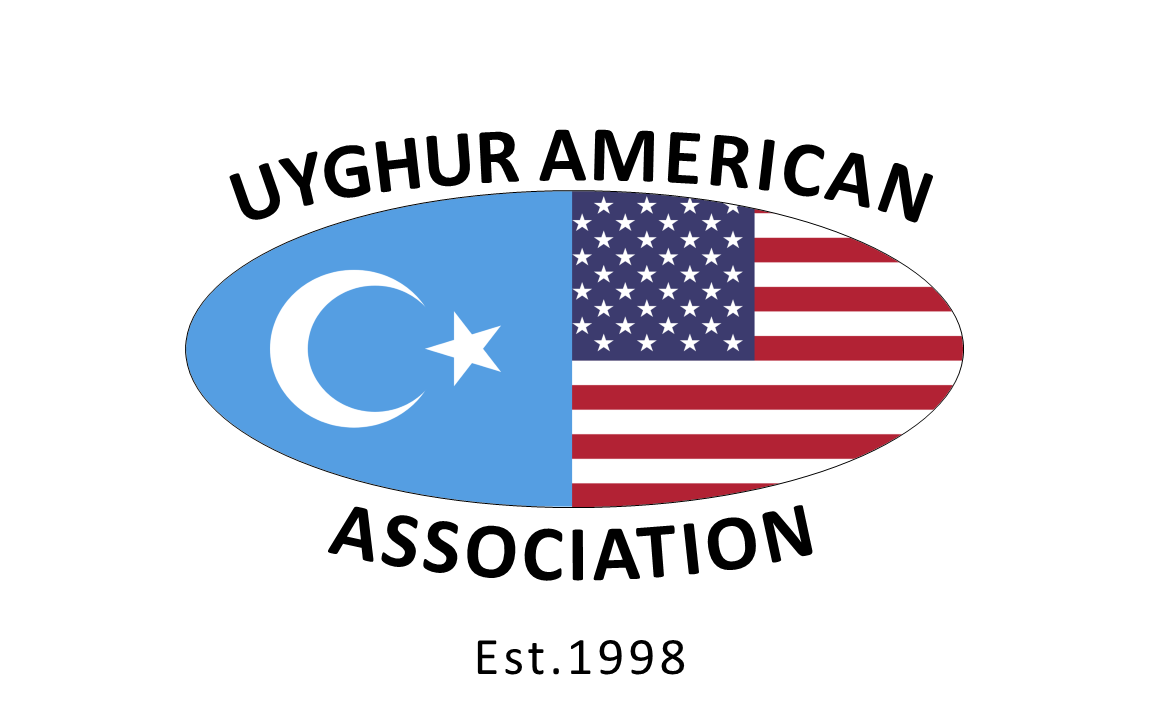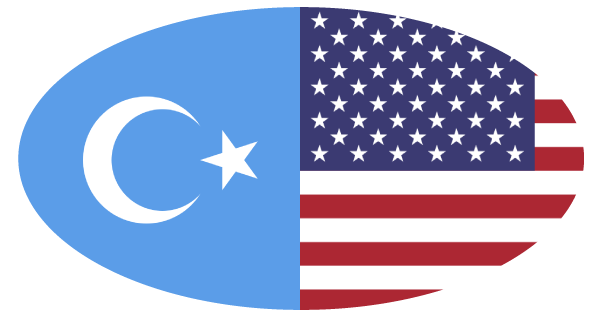Interview with Uyghur Protestor
On October 1st, Uyghurs, Tibetans, Hong Kongers, Southern Mongolians, Taiwanese, Chinese, and others held demonstrations in 90 cities throughout the world as part of the inaugural Global Day of Action against the Chinese Communist Party. In Washington, DC the Uyghur American Association performed a unique political theater action in front of the U.S. Congress to draw attention to the Chinese government’s horrific treatment of the Uyghurs and other Turkic peoples in East Turkistan. Over 100 Uyghur Americans kneeled in shackles, black blind folds and face masks, and wore blue prison uniforms with Kashgar Detention Center ( “喀什市看守所” ) displayed prominently on their backs. The costumes closely resembled the official prison uniforms worn by Uyghur detainees, as captured in the infamous, September 2019 drone footage from the City of Korla in East Turkistan. During the political theater action, Uyghur Americans held up over 150 photos of relatives, scholars, and ordinary Uyghurs who have been victimized by the Chinese government. Many of those victims have been disappeared, tortured, and killed in the Chinese concentration camps. Photos of the demonstration can be found on UAA’s Facebook page, and video coverage of the demonstration can be found on Radio Free Asia’s Facebook page.
We interviewed a member of the Uyghur American community that participated in the political theater action to hear her thoughts on the demonstrations and what it accomplished. The interview is transcribed here. To protect her identity, the interview was not recorded, and conducted entirely over Whatsapp chat. She is identified by the pseudonym “Rena”.
Note: There are some grammar and spelling errors on the part of both the interviewee and the interviewer. To avoid editorializing, these are left unchanged.
UAA: Can you set the stage for me? How did the protest go? Where was it and what took place?
Rena: Sure. The volunteers and UAA organizers arrived early around 8 am at the front of U.S. Congress to setup the stage and make other materials ready.
Around 10 am, most of the protesters arrived to the scene. Max Gelber and other organizers started to distribute prisoners outfit, handcuffs, blindfolds, and the pictures of actual victims of the concentration camp. After everyone got dressed up, we all lined up to recreate the actual scene of the camp.
At 11 am, event started off with a several statements given by UAA board members, Tibet leaders, Mongolian leaders as well as the congressman (sorry that I am really bad at remembering names, if you need their names, I can find out later and get back to you).
Around 12 pm, Max Gelber and several other protesters performed as Chinese cops who suppress and torture prisoners in the camp. As part of the performance: there was a little kid who was crying and seeking for her parents among the prisoners, which was sad and devastating for many, and people around me started to shedding tears. The cop took her away forcefully and said you don’t have parents. The cops also announced several crimes of the prisoners and what is the reason that they need reeducation, such as for contacting relatives outside of the country, for having long hair and beard, for wearing hijab, etc. They also showed how women were tortured in the mimicking Tiger Chair, and how they were forced sent [sic] to sterilization.
All of these scene was recreated [sic] almost perfectly with the help of almost everyone in the protest. However, it was also very terrifying and heartbreaking for all of us.
After the performance, along with Kuzzat and other people made their statements.
Too bad that I had an interview on the same day in the afternoon, so I had to leave and couldn’t participate the rest of the protest. I heard that they walked around the national mall.
UAA: That sounds very emotional. Whose idea was it to stage a re-enactment? Did any non-protestors get to witness it?
Rena: I believe it was initially Max Gelber’s idea, then after some discussion, the rest also agreed. As we , as Uyghur community, have been protesting around 5-10 times a year, we welcome any new ideas to make every single protest more successful.
And yes, i personally noticed many pedestrians, and people who were just simply jogging and running in the area intentionally stopped for a while to see what is going on.
UAA: That’s an impressive work ethic. After so many demonstrations, do you feel optimistic about what’s happening in Washington? What about the response of news media? The general public?
Rena: I do feel like we made a stronger impact and statement this time for several reasons. First of all, I witnessed a lot more reporters present at the event. Secondly, after our protest, many Uyghur community [sic] in other countries also organized many protests in front of their Chinese embassy. There’s protesters in London, France, Berlin, Oslo, Istanbul that I know of.
Last but not least, through all these protests and media response, I believe now there’s lot more people are aware of the Uyghur issue. Which is good and sad at the same time.
Good: because five years ago, if I talk to 20 people, only one or none of them know anything about Uyghur. Now every one out of five people in DMV area that I talk to, can hold a conversation with me, because now they are aware.
Sad: because Uyghur are known in the world level because of this suppression of communist. [sic] Narrative can be easily changed if you change the narrator. I know there are some government still support all the decisions made by CCP. And CCP can easily portrait [sic] us as “bad guys”. Uyghur culture is profound and colorful. We have so much more to share with this world. But too sad that that’s not the part that we are we’ll know for at this moment.
UAA: How can readers learn more about Uyghur culture?
Rena: There are certainly many books written by our scholars, and most of them can be found in English. From which, readers can learn more about our culture.
The UAA official website also has short introductions and some resources about our culture.
The easiest way I would say is through YouTube. Instead of searching “Uyghur” or “Uyghur Issue”, I suggest readers to search for “Uyghur Songs” , “Uyghur Movies”, “Uyghur Dance”, “Uyghur Food”.
Additionally, we have around 5 Uyghur restaurants in DMV area where people can have some hands on experience. Whether to observe the decorations/atmosphere, or to taste the food, I highly recommend people to go check out some of the Uyghur restaurants.
UAA: Very cool. One more question: I saw a video of the D.C. protest in which Rushan Abbas, from the Campaign for Uyghurs, said “we will use our words as weapons” in a speech addressing the protestors. Do you agree with this? Can words truly be used as weapons against the repression of a dictatorship? How do you feel about the effectiveness of protest in general? What do protests accomplish? What did this specific protest hope to accomplish?
Rena: In our contemporary society, I also would like to think words can be used as weapons. With the help of advanced technology, almost everyone in the whole world has easy access to social media. With that said, having such frequent and “loud” protest can definitely stir up some heated discussion. And the more social media report/discuss our issue, the more people will be aware of it.
However, merely words cannot put an end to the repression and dictatorship, more concrete actions need to be taken.
As for the effectiveness of our protest in general, I truly believe we have made some progress. Nury A. Turkel is an Uyghur American attorney, public official and human rights advocate, who is also the organizer of the Uyghur Human Right Project. With his help and statement given in U.S. congress in November 2019, President Trump signed the Uyghur Human Rights Bill, which I believe is the accumulative results of many protests, and efforts put in by the activists like Nury Turkel, Rushan Abbas, and other UAA members.
As for this specific protest we held on October 1st, the proven accomplishment is how Uyghurs in other countries also added their own contribution towards making a world level “loud” statement. Only when the words are loud enough then it can be considered as a weapon.
I just want to add a few things.
In fact, the protest could be bigger and louder. But many Uyghurs are afraid to go out in public, or make an open statement online. Because Chinese spies are everywhere to find out which individuals are behaving/saying things against the Chinese authorities. To take myself as the example: when I first came to America, I was actively participating all the possible protests and conferences (2015-2016). Then in May 2016, my mom disappeared, later on I found out that she was taken to the concentration camp. In February 2018, one Chinese policeman contacted me and asked me to provide all the school paperwork to prove that I am a full time student (since I came to U.S with F1 student visa), and asked me not to contact my father ever, then threatened me if I do not cooperate, they would take my dad to the camp. … There are many Uyghurs facing the same threat like I do, some are brave enough to do something about it, but most are not.
Recently, one Uyghur girl who came to U.S almost a year ago told me that her mother and two sisters are taken to the reeducation camp. She is so brave that she started to post blogs and tweets online exposing the inhuman actions of CCP. She said anytime when Chinese authority post something on WeiBo, she added comments on each post, asking her family’s whereabouts. Then, Chinese cops contacted her and asked her to be quite and take off all the posts. She did not just listen, she negotiated. She said:”if you don’t release my family and allow them to contact me, my posts will be just louder and bigger.” Finally, Chinese authority released one of her sisters and her mother. She is doing everything she could to rescue her another sister. [sic]
After listening to her story, I realized we need more brave activists like her. And her story encouraged me to get back to what started in the beginning without any fear. If every single one of the Uyghurs can come into the same state of mind, I am positive that we can make bigger impact. And by doing so, we will get more help from UN and U.S government, and finally put an end to CCP’s dictatorships.
UAA: Thank you very much, I appreciate you talking to me today.
Rena: You are very welcome, it’s my pleasure.

